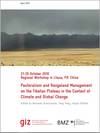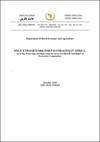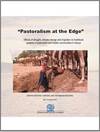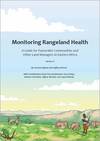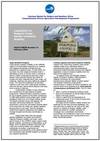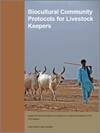"We, the women pastoralists gathered in Mera, India, from November 21-26, 2010, representing 32 countries, have met to strengthen alliances and forward practical solutions to issues that affect us."
"We present this declaration as a guiding political document to inform and support the development of pastoralist policies."
Year of publication: 2010Organization: 个人作者
Topic: 性别和青年问题, 参与
Language: English, Français, Español
Type of document: 政策和立法
Geographical coverage: 全球
The regional workshops within the mountain development programme of InWEnt aim at addressing pressing problems of mutual interest among the participating partners by focusing on a specific topic. In 2010 two conferences on pastoralism were held in the framework of the mountain development programme. Complementing the series that started with the Khorog and Kashgar workshops in July the Lhasa gathering happened to be the final part with a special focus on pastoralism and rangeland management on the Tibetan Plateau. It seems to have been the appropriate timing to emphasize upon a pressing issue that is generating increased and rejuvenated interest in the debates on biodiversity, climate and global change. Planners are challenged by designing concepts for nature protection and resource management in order to implement “green policies”. Decision-makers keep in mind the dual challenges between livelihood improvement and natural resource management by translating and transferring it into modernisation programmes. Far-reaching policies that aim at a reconciliation between ecological necessities and economic demands are tested and implemented in a grand design. Especially the Tibetan Plateau is an arena where the term eco-shelter has become a specific meaning that is affecting the reconciliation between nature and society as well as leading to far-reaching transformations in settlement structures and economic strategies. Recent interventions have changed and modified pastoral practices, terminated and extinguished certain traditions and opened-up new hitherto unknown and unexpected opportunities for pastoralists on the Tibetan Plateau. On the vast Tibetan Plateau pastoralism and rangeland management are not only challenges for regional planning, both sectors offer a tremendous economic potential and are proof for the adaptive properties and resilience of pastoralists exposed to harsh environmental conditions and all kinds of changes.
Year of publication: 2010Organization: 个人作者
Topic: 气候变化
Language: English
Type of document: 技术
Geographical coverage: 中亚地区
The Policy Framework for Pastoralism in Africa is the first continent-wide policy initiative which aims to secure, protect and improve the lives, livelihoods and rights of African pastoralists. The policy framework is a platform for mobilizing and coordinating political commitment to pastoral development in Africa, and emphasizes the need to fully involve pastoralist women and men in the national and regional development processes from which they are supposed to benefit. The framework also emphasizes the regional nature of many pastoralist ecosystems in Africa and therefore, the need to support and harmonize policies across the Regional Economic Communities and Member States.
Year of publication: 2010Organization: 非洲动物资源局
Topic: 食品安全, 土著人民, 组织, 参与, 社会服务
Language: English
Type of document: 政策和立法
Geographical coverage: 北非, 西部非洲, 中部非洲, 东部非洲, 南部非洲
The purpose of this paper is to review demographic trends as well as settlement and service provision patterns using quantitative data, where possible, and drawing on experiences, evidence and lessons from the Horn and East Africa regions. It addresses some of the most salient issues around pastoral livelihoods, emphasising the need to improve understanding in efforts to promote the resilience of these livelihoods. This study recognises the complexity of the issues and does not aim to provide answers, but rather to highlight issues and pose questions that policy makers, politicians and other key stakeholders need to grapple with in order to put into practice measures to reduce risk and mitigate vulnerability.
Year of publication: 2010Organization: 乐施会
Topic: 复原力, 社会服务
Language: English
Type of document: 技术, 科学
Geographical coverage: 东部非洲
This study examines the effects of climate change, drought and decreasing natural resources
amongst mobile populations, specifically pastoralists in the North Eastern and North Rift Valley provinces of Kenya. The study provides an evidence base and proposes programmatic interventions that would be implemented in collaboration with the regional governments and other key players to address conflicts over resources and increased migration to [peri] urban areas.
Organization: 个人作者, 联合国环境规划署
Topic: 气候变化, 土著人民
Language: English
Type of document: 技术
Geographical coverage: 东部非洲
This guide is written for people who want to design and implement a simple rangeland monitoring programme in Eastern Africa. It outlines a series of steps that will enable community members and other land managers to decide what, where, when, and how to monitor, as well as how to interpret and apply the results of their monitoring. The guide introduces a simple set of methods for collecting monitoring data using only a pencil, a stick, and a single datasheet.
Year of publication: 2010Organization: 个人作者
Topic: 土地
Language: English
Type of document: 技术
Geographical coverage: 东部非洲
Lessons from West Africa indicate cross-border mobility needs to be addressed within a comprehensive policy, legal and institutional framework that harmonizes national and regional legislation to secure livestock mobility from the local to the regional level. At regional level, the ECOWAS decision agreed in Abuja in October 1998 provides a regional framework for cross-border transhumance between fifteen member states.
Year of publication: 2010Organization:
Topic: 冲突, 参与
Language: English
Type of document: 政策和立法
Geographical coverage: 西部非洲, 东部非洲, 南部非洲
Biocultural community protocols are a new approach with great potential for empowering pastoralists and other traditional livestock-keeping communities. They are both a process and a document in which communities invoke their rights as guardians of biological diversity under Article 8j of the United Nations Convention on Biological Diversity. Claiming rights for in-situ conservation, they also help promote livestock keepers’ rights to maintain their breeds and continue their traditional management practices.
Biocultural community protocols put on record traditional knowledge and the biodiversity that communities steward, in a process that the communities themselves drive. In developing a biocultural community protocol, communities become informed about national and international laws that protect their rights. This book provides an overview of the process as well as its legal background and describes the first experiences with implementing this approach by livestock keepers in Asia and Africa.
Year of publication: 2010Organization: ,
Topic: 土著知识, 组织, 参与
Language: English
Type of document: 技术
Geographical coverage: 全球



